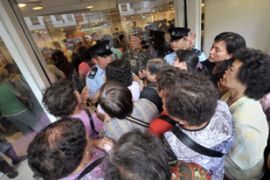Rumours spark Hong Kong bank run
Bank of East Asia denies instability after hundreds demand deposits back.

The bank gave assurances that its capital ratio was well above international standards.
Seeking to calm investors, it also said that its combined exposure to failed US investment bank Lehman Brothers and bailed-out insurer American International Group (AIG), was about $61m.
‘Sound bank’
Joseph Yam, the chief of the Hong Kong Monetary Authority, the Chinese territory’s de facto central bank, dismissed the rumours as “unfounded” and said BEA was “a very sound bank”.
The authority also said Hong Kong’s banking system as a whole was “safe and sound”.
But with debt and credit problems affecting the world’s financial institutions, many of the bank’s Hong Kong customers were less than assured.
“I’m very afraid. I’m very worried,” said Cindy Li, a 48-year-old waitress who showed up at the bank’s headquarters to withdraw her entire savings of more than $26,000.
“I don’t know what the world has come to. It’s better if I keep my money on hand.”
The company’s stock tumbled almost seven per cent to HK$25.15.
The rumours apparently emerged after Moody’s Investors Service changed its outlook on BEA’s credit rating from stable to negative on Friday, citing a recent insider trading case that exposed “lacklustre internal controls” at the bank.
Last week, the bank revealed a trading loss of nearly $12m it says was incurred by a rogue equity derivatives trader who “manipulated” valuations to hide losses.
The discovery forced the bank to revise down its earnings for the first half of the year.
Lehman-linked probe
BEA’s troubles come as Hong Kong’s financial regulator said it had launched an investigation into a failed investment scheme linked to Lehman Brothers that has affected hundreds of people.
The Securities and Futures Commission (SFC) said it would examine whether the products had been improperly sold to retail investors – many of them retirees who had put in all their savings – who say their own banks encouraged them to invest, but did not warn them of the risks.
The Lehman-licensed mini-bonds were made worthless once the guarantor – Lehman – went bankrupt.
Investors who had bought $1.63bn of the products had on Tuesday threatened to sue up to 21 institutions who had sold them, Albert Ho, a Hong Kong legislator, said.
Lehman Brothers, one of Wall Street’s most established investment banks, collapsed last week.